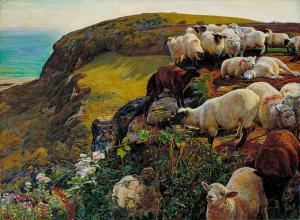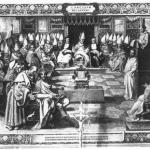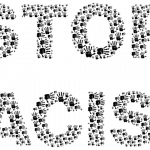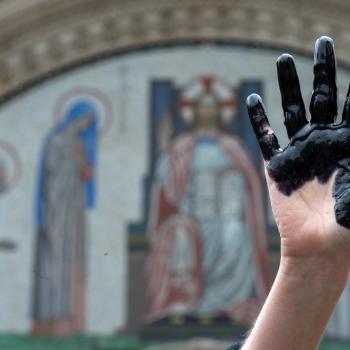
The world is being transformed, indeed, malformed, by modern humanity. The reality of climate change demonstrates the way humanity can and does negatively influence the world. It’s not just climate change. It is how human treat ecological threats as a whole which should concern us. Humanity has destroyed countless species of life in its attempt to control and dominate nature. But these species of life were invaluable for the delicate balance of life on the planet. Remove too many of them, and ecological disaster is likely to ensue.
Urbanization has destroyed a great number of natural habitats for various kinds of wildlife. It is because we have further entered into the domains of all kinds of animal life, we find them entering our domains, adapting the best they can to their new environment. As a result, we often consider them to be pests to be eliminated. We do not want coyotes, deer, raccoons, wolves, and the like living in and around our neighborhoods. Yet the problem is one which we have created. We do not want them to live near us, and yet, since we have taken over their homelands, where are they to live? Killing them is no solution because we need these species for a healthy ecological balance: the more we destroy, the more imbalanced the world will become, until the whole ecological balance will be destroyed; it is doubtful that humanity continue survive in such a future.
Likewise, even if we have not yet entered into their homelands, what we do to the earth, through our climate change, is nonetheless having negative impacts on wildlife because climate change is affecting their habitants, transforming them into places in which the various species of the earth can no longer thrive. There is some shifting of species which follows with the transformation of these habitats, but not all species are able to adapt. We are seeing a major disaster happening before our eyes: “Globally, mammal wildlife populations are reported to have undergone a 52% decline in the past half-century […] but over longer time periods, the ranges and population declines have been far more severe.”[1] Pope Francis, likewise, reported:
Each year sees the disappearance of thousands of plant and animal species which we will never know, which our children will never see, because they have been lost for ever. The great majority become extinct for reasons related to human activity. Because of us, thousands of species will no longer give glory to God by their very existence, nor convey their message to us. We have no such right.[2]
The world was wondrously made by God. Patriarch Bartholomew, seeing the glory of God presented by creation, indicated its sacramental nature:
He made the waters, the land, the sky, and the living creatures. “And God saw that it was good [kalon],” which literally means “beautiful.” This beauty is, first and foremost, the beauty of divine sacredness, a self-revelation and self-realization of God, who invites us to share in and to enjoy that beauty. For everything that lives and breathes is sacred and beautiful in the eyes of God. The whole world is a sacrament. The entire created cosmos is a burning bush of God’s uncreated energies. [3]
By ignoring the beauty of creation as we pulverize it for our own use, we blaspheme God. This is why Pope Francis said we have no right to do what we are doing: we are violating the greatest commandments by our willful destruction of the earth.
Instead of properly engaging creation as stewards looking after a beautiful garden, we plunder it. What should we expect from God when he calls us to account, showing us how we have become like robbers looting his beautiful treasure? But have we not become something worse than robbers, but actual predators, seeking joy in the destruction? How else can we explain the way humanity raises up and glorifies such dishonorable activities as trophy hunting, in which animals are treated not as creatures of their own worth, but as articles of sport for our own short-term pleasure? But it is not just trophy hunting which is a problem; it is when we see hunting as a necessary evil in order to control animal populations we see, once again, the predatory nature of humanity reveal itself. Does this not indicate the nihilistic nature of modern society as we see the only way to deal with our problems is to destroy it, without considering the harm being done by our destructive ways? Combined with the fact that animal species are becoming extinct through our interference in the world’s eco-systems, hunting those species which somehow survive and thrive will only hasten the destruction of the earth itself. We must find ways to deal with them without harming them, to make new habitats for those we have disturbed, unless we want to destroy the delicate balance of the web of life, and end up with a new mass-extinction on earth which will likely include the end of humanity itself.
St. John Paul II understood that we must begin to ponder what we are doing to the earth, and find ways to deal with the destruction which we have caused and fix it so that we can fulfill our duty to the earth. “We seem to be increasingly aware of the fact that the exploitation of the earth, the planet on which we are living, demands rational and honest planning.”[4] This planning requires a shift in the way we think about and treat animals (and all other forms of life). They must not be viewed as objects or things to be manipulated, but rather, they must be seen as part of God’s intention for creation, and so imbued with a goodness and value all their own. Our power to dominate them does not give us the right to do so; if we think that might means right then, as Pope Francis exclaimed, society as a whole will fall for this dangerous ideology which leads to injustice and violence the world over:
Yet it would also be mistaken to view other living beings as mere objects subjected to arbitrary human domination. When nature is viewed solely as a source of profit and gain, this has serious consequences for society. This vision of “might is right” has engendered immense inequality, injustice and acts of violence against the majority of humanity, since resources end up in the hands of the first comer or the most powerful: the winner takes all.[5]
That transformation requires us to truly appreciate animals as sentient creatures, indeed, as creatures with various emotional – and intellectual – capabilities which deserve respect:
When it comes to our relationships with animals, our vision of who they are and what they mean to us requires that we change the way we have always treated them. We know that animal beings are not “things” that exist for our convenience. Animals are subjective beings who have feelings and thoughts, and they deserve respect and consideration. We don’t have the right to subdue or dominate them for our selfish gain – to make our lives better by making animals’ lives worse. Further, as self-conscious, sentient beings ourselves, we are able to recognize suffering, and we are obliged to reduce it whenever we can. By making decisions that help animals, we are compassion, not cruelty, to a “wounded world,” as the ecologist Paul Ehrlich calls it.[6]
This, then, should return us to the question of hunting. By its nature, it rejects the good of those being hunted; sometimes, a hunter tries to justify their actions by saying they hunt only dangerous animals. And at times, when there were limited means to control them and they did present clear and present danger to society (and to other forms of life), that justification might work. However, when such an excuse is used when other means of controlling the danger are possible, then it must be rejected. We must understand for many, the joy of the hunt is the joy of proving oneself superior to some other creature, and that superiority is shown by its destruction. Is it any wonder that many authors have criticized this ideology by showing it being played out with other humans, such as we find in the story, “The Most Dangerous Game?”
Christians must see that any hunting engaged for sport, any hunting which is truly unnecessary, all deserves to be rejected because it places humanity into a position contrary to the stewardship they should have over the earth. Such hunting can only be accepted when animals are treated as mere goods, not good sentient creatures with their own worth given to them by God. Indeed, as Andrew Linzey realized, there is a sense that such an ideology can be shown to contest the teachings of the Gospel, for the Gospel preaches the promotion of all life since God gives his grace to elevate the rest of creation, while hunting seeks its destruction. If such predatory nature was accepted and glorified, if it was the intent of God that we should feel free to hunt and take as we like all that is of the earth without concern for their own good, would it not be something demonstrated to us in the life of Jesus, as Andrew Linzey asked?
For if it was really true that predation is God’s will, it would have to follow for Christians that the life of Jesus – what after all is the self-disclosure of God – manifested and vindicated this predator/prey relationship. [7]
Jesus, Andrew Linzey suggested, would have and should have been the ultimate butcher:
Jesus, according to the Predator gospel, would be the butcher par excellence. He would be the one who far from desisting from animal sacrifice actually encouraged his disciples to excel in it. Instead of driving out the sacrificial animals from the Temple, the Jesus of the Predator Gospel would drive them in.[8]
For Christians, the fact that Jesus’ death and resurrection indicates an end to the sacrificial system as a whole (a process which was already forming in Judaism before Jesus, and so had Jewish antecedents) should demonstrate that Jesus, as the final and perfect revelation of God, goes against the spirit of predation and instead suggests us to move beyond it into a new way of existence with the earth with the peaceable kingdom of God.
When hunting is seen as necessary to control animal populations, as such hunting requires consistent promotion of such hunting, year after year, it is clear the supposed good done by such hunting is superficial, and other means can be and should be tried in order to deal with such wildlife. Or, as Marc Bekoff explained, we need to find a means of peaceful co-existence:
Whatever short-term benefits killing wild animals provides, these don’t work for the long term. Killing is easy, but it’s not a lasting solution. Wild animals abide by their evolutionary behaviors, and then they adapt to the encroachments of our civilization, and it is only by our definitions that they become “pests” or “nuisances.” It is incumbent on us to curb ourselves, our expectations, and our “boundaries,” to reduce conflicts with wild animals. Peaceful coexistence is possible without having it depend on eliminating the other side.[9]
With the widespread destruction of the earth, with the widespread destruction of wildlife habitats by human encroachment into their lands as well as through climate change, humanity must take extra care of the species of life which have yet to go extinct, and to try to prevent their extinction. Hunting for pleasure, as well as hunting for the sake of population control, are all short-sighted and hinder proper human interaction with the animal world. As stewards of the earth, we should rather reflect upon the example given by the story of Noah, where humanity sees it is its duty to preserve and protect the species of the earth instead of destroy it. Now, when meat-eating is a necessity, and hunting is the means of gaining proper nutrition, the nature of the necessity might justify hunting, but even then, it should be done with care and concern with the animal population, so it is not overhunted and destroyed. But when other forms of diet are possible, even such hunting can be brought into question as to whether or not it remains necessary.
We must become aware of the way our actions affect the earth and its inhabitants. If we do not take into consideration the changing nature of the ecosystem before us, we risk the end of life as we know it. For some, this might be what they really desire: they want to bring about the end of the world, and so they have no problem bringing great suffering to the world in order to accomplish their desire. Some of them claim to be Christian, but how can they not see that their actions and treatment of the earth and its beauty is the kind of blasphemy one expects from demons and not those who claim to love God? How can they not see their actions, in contradiction to Christ, represents the spirit of the anti-Christ which promotes predation and destruction, against the spirit of Christ who promotes healing and unity? The way we live, what we promote as a good, determines our relationship with God. If we truly believe that a careless, disrespectful treatment of the earth and its species is acceptable by God, what do we expect from such a God who find such activity acceptable? Why should we not be treated likewise from him? With the revelation of God in Jesus Christ, we find the answer, not in the spirit of predation, but rather its reverse, in the promotion of life and the harmony which we should have with the whole of creation. The way God acts in and through Jesus, in and through creation, should form the guidelines by which Christians act in the world:” All these things are preeminently indicative of the compassion of an omniscient and omnipotent God. And they should certainly and ceaselessly constitute a guiding policy of our own ethos in the world.”[10]
[1] Simon G. Dures, Chris Carbone, Andrew J. Loveridge, Glyn Maude, Neil Midlane, Ortwin Aschenborn and Dada Gottelli, “A Century of Decline: Loss of Genetic Diversity in a Southern African Lion-conservation Stronghold” in Diversity and Distributions Vol. 25, No. 6 (June 2019): 871.
[2] Pope Francis, Laudato si’.Vatican Translation. ¶33.
[3] Patriarch Bartholomew, “Beauty and Nature” in Cosmic Grace. Humble Prayer: The Ecological Vision of the Green Patriarch Bartholomew. Ed. John Chsyssavgis (Grand Rapids, MI: William B. Eerdmans Publishing Company, 2003; rev. ed. 2009), 185.
[4] St. John Paul II, Redemptor Hominis. Vatican Translation. ¶15.
[5] Pope Francis, Laudato si, ¶82.
[6] Marc Bekoff, The Emotional Lives of Animals (Novato, California: New World Library, 2007), 135-6.
[7] Andrew Linzey, Animal Theology (Chicago: University of Illinois Press, 1994), 120.
[8] Andrew Linzey, Animal Theology, 120.
[9] Marc Bekoff, The Emotional Lives of Animals, 162.
[10] Patriarch Bartholomew, “Environment and Ethics” in Cosmic Grace. Humble Prayer: The Ecological Vision of the Green Patriarch Bartholomew. Ed. John Chsyssavgis (Grand Rapids, MI: William B. Eerdmans Publishing Company, 2003; rev. ed. 2009), 137.
Stay in touch! Like A Little Bit of Nothing on Facebook.
If you liked what you read, please consider sharing it with your friends and family!













